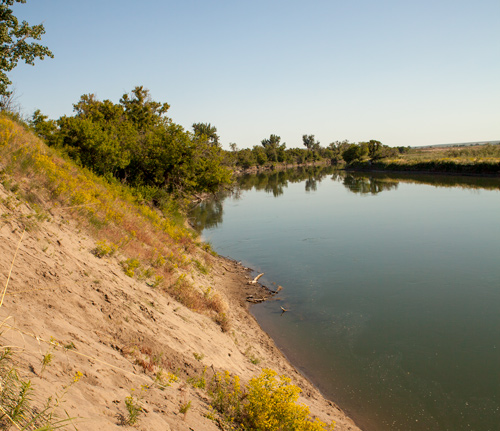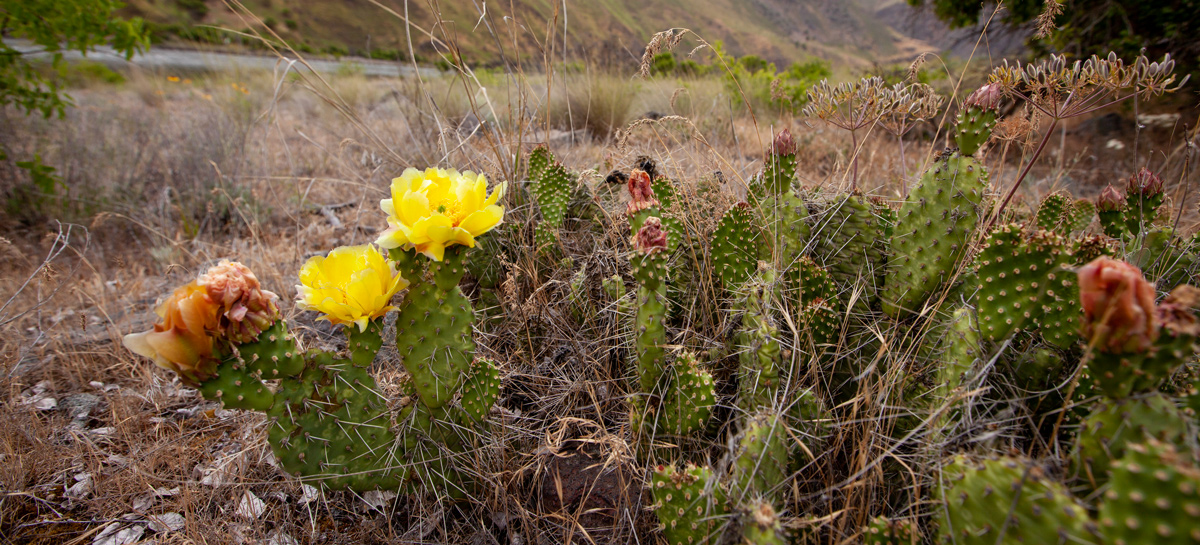After laboring since 2 June 1805 to move past the Great Falls of the Missouri, the expedition is finally moving again. They make about twenty-six river miles passing the Smith River, a fort mountain, and blooming prickly pears. Lewis’s dog Seaman helps kill a deer.
On the Way to the Three Forks
by Yellowstone Public Radio[1]Originally aired weekdays by Yellowstone Public Radio during the Bicentennial observance of 2003-2006. Narrated by Hal Hansen. Scripts by Whit Hansen and Ed Jacobson. Produced by Leni Holliman. © … Continue reading
Missouri River Bank
Dunes Fishing Access Area, 2 July 2013. © by Kristopher K. Townsend. Permission to use granted under the Creative Commons Attribution-Share Alike 4.0 International license.
Leaving the Falls
We arrose very early this morning, assigned the canoes their loads and had it put on board. we now found our vessels eight in number all heavily laden, notwithstanding our several deposits; tho’ it is true we have now a considerable stock of dryed meat and grease. we find it extreemly difficult to keep the baggage of many of our men within reasonable bounds; they will be adding bulky articles of but little use or value to them.
—Meriwether Lewis
Naming the Smith River
in order to lighten the burthen of the canoes I continued my walk all the evening and took our only invalledes Potts an LaPage with me. we passed the river near where we dined and just above the entrance of a beautifull river 80 yards wide which falls in on the Lard. side which in honour of Mr. Robert Smith the Secretary of the Navy we called Smith’s River.
—Meriwether Lewis
Seaman Helps Hunt
we waited untill the canoes arrived by which time it was so late that we concluded to encamp for the night. here Drewyer wouded a deer which ran into the river my dog [Seaman] pursued caught it drowned it and brought it to shore at our camp.
—Meriwether Lewis
Passing Fort Mountain
we have now passed Fort Mountain [Square Butte] on our right it appears to be about ten miles distant . . . . I could see that it was covered with a similar cost of grass with the plain on which it stands. the surface appears also to possess a tolerable fertile mole [mold] of 2 feet thick, and is to all appearance inaccessible. from it’s figure we gave it the name of fort mountain.
—Meriwether Lewis
High Sand Banks
we find it inconvenient to take all the short meanders of the river which has now become cooked and much narrower than below . . . . on the banks of the river there are many large banks of sand
—Meriwether Lewis
Blooming Prickly Pears
Plains Prickly Pear
Opuntia macrorhiza
Location: Snake River Ordway Site, 26 May 2013. © by Kristopher K. Townsend. Permission to use granted under the Creative Commons Attribution-Share Alike 4.0 International license.
the prickly pear is now in full blume and forms one of the beauties as well as the greatest pests of the plains. the sunflower is also in blume and is abundant.
—Meriwether Lewis
Weather Diary
State of the thermometer at rise
Weather at rise
Wind at rise
State of the Thermometer at 4 P.M. Weather at 4 P.M. Wind at 4 P.M. State of the river 60 [above 0] fair after rain S. W. 76 [above 0] fair S W. fallen 1 ½ in. Set out from our upper camp above the falls where we built 2 canoes.
—Meriwether Lewis and William Clark[2]To assist the reader, the editor of this web page has omitted the date column, merged the “State of the river” columns, and spelled out some abbreviations.
Square Butte is a High Potential Historic Site along the Lewis and Clark National Historic Trail managed by the U.S. National Park Service. The site is privately owned but can be seen for several miles around Great Falls, Montana.
Notes
| ↑1 | Originally aired weekdays by Yellowstone Public Radio during the Bicentennial observance of 2003-2006. Narrated by Hal Hansen. Scripts by Whit Hansen and Ed Jacobson. Produced by Leni Holliman. © 2003 by Yellowstone Public Radio. |
|---|---|
| ↑2 | To assist the reader, the editor of this web page has omitted the date column, merged the “State of the river” columns, and spelled out some abbreviations. |
Experience the Lewis and Clark Trail
The Lewis and Clark Trail Experience—our sister site at lewisandclark.travel—connects the world to people and places on the Lewis and Clark Trail.
Discover More
- The Lewis and Clark Expedition: Day by Day by Gary E. Moulton (University of Nebraska Press, 2018). The story in prose, 14 May 1804–23 September 1806.
- The Lewis and Clark Journals: An American Epic of Discovery (abridged) by Gary E. Moulton (University of Nebraska Press, 2003). Selected journal excerpts, 14 May 1804–23 September 1806.
- The Lewis and Clark Journals. by Gary E. Moulton (University of Nebraska Press, 1983–2001). The complete story in 13 volumes.





